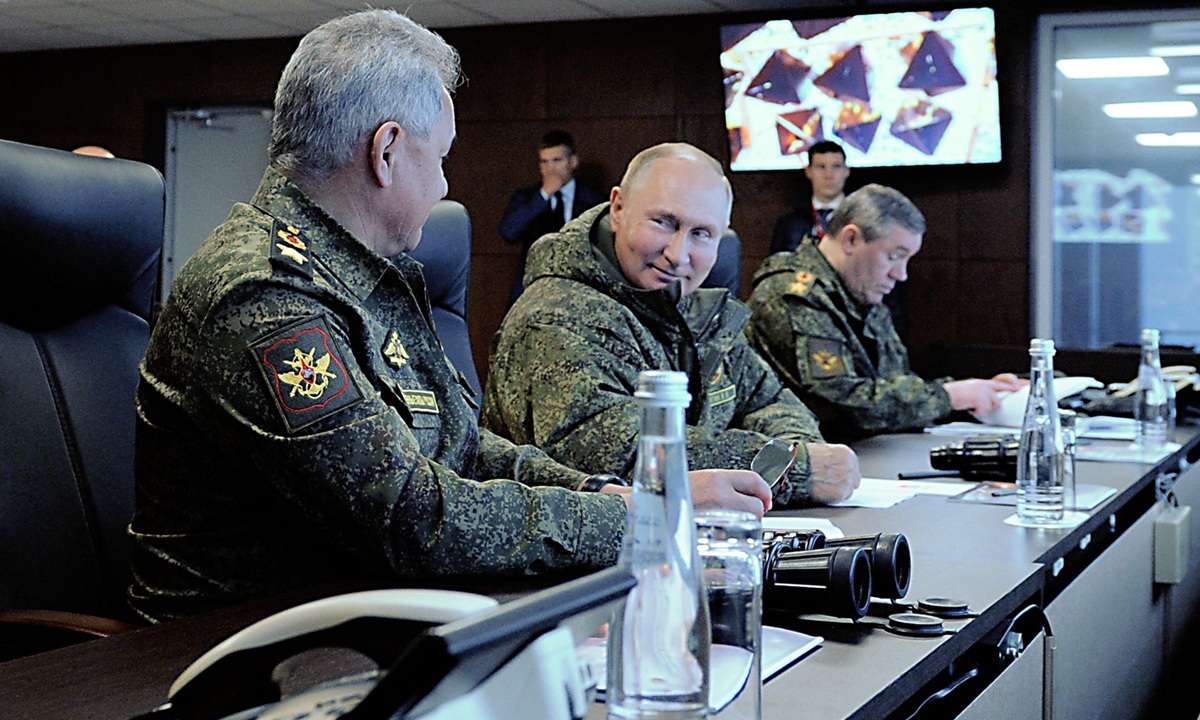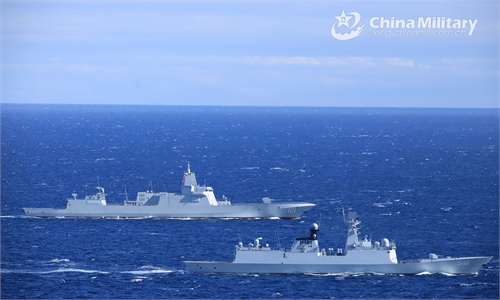China-Russia drills to safeguard regional peace, deter ‘troublemakers in the region’
Japan suffered from consequences of following too closely with the US: experts

Russian President Vladimir Putin (center), accompanied by Defence Minister Sergei Shoigu (left) and Valery Gerasimov, the chief of the Russian General Staff, oversees the "Vostok-2022" military exercises at the Sergeevskyi training ground outside the city of Ussuriysk on the Russian Far East on September 6, 2022. Photo: VCG
Russian President Vladimir Putin inspected the military exercise participated by multiple countries, including China and India, in Russia on Tuesday, just one day after Japan protested the drills conducted near the Japan-claimed islands. Analysts said Moscow is warning Tokyo with tough actions that Japan's opportunistic diplomacy - forcing Russia to compromise on sovereignty disputes by following the US closely in sanctioning Russia - is wishful and doomed to fail.
Russia-Japan relations are based on utilitarian basis - Russia wants Japan's investments while Japan wants Russia to compromise on the Kuril Islands dispute, also known as the Northern Territories dispute in Japan. But right now, such fragile ties have been completely ruined as Russia has abandoned all expectations and illusions on Japan because Tokyo has followed Washington closely in sanctioning Russia after the Ukraine crisis, and it's unlikely to be recovered in the future, experts said. They noted that Tokyo is paying the price for its policy of loyally serving Washington just like a US colony.
Japan's policy has made both China and Russia sense that it will help the US in the region to contain the two major powers, and even pose military threats to both Russia and China in the Kuril Islands and the Taiwan Straits, so it's natural and reasonable for China and Russia to stand together and make joint efforts to deter the potential troublemakers in the region, analysts said.
Worsening Russia-Japan ties
Putin arrived on Tuesday at the Sergeyevsky range in Primorsky Region, which is hosting the international Vostok 2022 drills, Kremlin spokesman Dmitry Peskov told journalists as he explained the Russian leader's itinerary, RT reported.
Vostok 2022 is part of a series of strategic military training exercises held by Russia each year. It is hosted by one of its military districts on a rotating basis. This year, the Eastern Military District of Russia welcomed 13 foreign countries, including China, which have sent troops and observers to Russia.
Japan has protested to Russia over the multinational military exercises being conducted on "Russian-held islands claimed by Japan," and "is seriously concerned about shooting drills by Russian and Chinese warships off Japan's northern coast," Japanese Chief Cabinet Secretary Hirokazu Matsuno said Monday, AP reported.
Japanese media Nikkei reported on Tuesday that Russia scrapped an agreement with Japan to allow Japanese former residents to visit "disputed islands off Hokkaido" without visas, triggering a protest from Tokyo as tensions between the two nations remain high.
"It is a forced measure and very sensible for the Japanese side. It followed as a response to the illegal sanction pressure exerted by the Japanese government and it's joining the West's Russophobic policy," Leonid Slutsky, chairman of the international committee of the Russian State Duma (lower parliament house), told TASS on Tuesday.
Japan was designated by Russia as an unfriendly nation after the Russia-Ukraine conflict in February and Moscow announced it was suspending negotiations for a peace treaty with Japan.
Japanese Foreign Minister Yoshimasa Hayashi said at his news conference on Tuesday that the latest move was "extremely inappropriate and something Japan can never accept." He added that an official protest would be lodged through diplomatic channels, Asahi Shimbun reported.
Cui Heng, an assistant research fellow with the Center for Russian Studies of East China Normal University, told the Global Times on Tuesday that "the starting point of Russia-Japan tension is when Tokyo followed the US to sanction Russia after the Ukraine crisis. From Moscow's perspective, Tokyo has already taken sides, so it's unnecessary to please it anymore, and that's why we can see Russia is getting increasingly tough toward Japan."
Before the Ukraine crisis, the Russia-Japan ties were utilitarian in nature, which lack of mutual trust and favorability. When Japan can't provide investment to Russia and even impose sanctions against Russia, Moscow won't be hesitant to let Tokyo understand Russia won't make any compromise on sovereignty disputes and will even increase military activities around Japan, Cui noted.
A Beijing-based expert on international relations who asked for anonymity told the Global Times on Tuesday that Japan's diplomacy and strategy are always opportunistic, as some Japanese leaders might believe that following the US to sanction Russia might give Japan some leverage to bargain with Russia on the territorial disputes, but the fact just proves that "Japan made the wrong bet."
Safeguarding peace
With the attendance of Putin, the Vostok-2022 strategic exercise entered its main and final phase on Tuesday after kicking off on Thursday, which simulated a joint counterattack operation by a coalition group consisting of participating countries including Russia and China against an imaginary enemy on Russian soil.
According to the operation plan the Russian Defense Ministry previously announced , the coalition group would first capture an advantageous line by breaking off hostile line of defense under the support of army aviation and artillery forces in the three-stage operation at the Sergeyevsky training ground.
At the second stage, the coalition group would launch concentrated fire strikes on hostile command posts, artillery positions and air defense systems with warplanes, missiles and artillery fires in order to disrupt the enemy's command and control system as well as to gain fire superiority and air supremacy.
Wrapping up the exercise, the troops of the coalition group would go on the offensive and defeat the hostile forces under the support of artillery and army aviation forces.
The exercise has ended with defeat of the hypothetical enemy, TASS reported on Tuesday.
The Vostok-2022 exercise also involves warships operating in the waters and coastal zones of the Sea of Okhotsk and the Sea of Japan.
While the Vostok-2022 is a regular event not targeting a third party and not related to the current regional or international situations, any military exercise, particularly those of strategic significance, has practical meanings, which is reflected by the arrangement of the exercise, a Beijing-based military expert told the Global Times on Tuesday, requesting anonymity.
The main topic of the exercise, which takes place in the Far East region of Russia, is counterattack, which means the exercise organizers suppose that there could be a military threat that could attack and attempt to occupy Russian territories in the region, leading to the need of a counterattack, the expert said.
With Japan also hyping tensions in the Taiwan Straits and attempting to interfere in the Taiwan question, which is an internal affair of China, military cooperation between China and Russia can deter Japan in sabotaging peace and stability in the region, analysts said.



